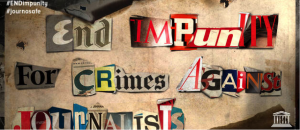Regional seminar: “Strengthening regional cooperation to end impunity for crimes and attacks against journalists in the Arab world”
Beirut, Lebanon 2 November 2018

Where better to hold this year’s regional seminar to mark International Day to End Impunity for Crimes against Journalists than the capital of Lebanon? As it the case throughout much, if not all of the Arab region, its media are victim to politicisation and polarisation. Ranking only 100th in RSF’s World Freedom Index, they can list many occasions , and very recently, when their journalists have been and continue to be harassed and prosecuted before military courts.
Today’s event, held at the Coral Beach Hotel on the shores of the Mediterranean, brings together representatives of Member States, the media, civil society, judicial systems from this region and beyond, and is the fifth such regional commemoration. Events started in 2014, a year after the UN General Assembly adopted its resolution on the safety of journalists. The first Inter-regional dialogue was held at the Strasbourg court, organised by UNESCO, several major European bodies and the UK-based Centre for Freedom of the Media (CFOM) and the University of Sheffield (UK).
The aim of this year’s Regional event, as stated by Mr Hamed Al Hammami, Director of UNESCO’s Beirut Office in his welcoming remarks, was to ‘reinforce cooperation from actors throughout the region’. 1010 journalists were killed in the pursuit of their profession between 2006 and 2017. The figures are a shocking representation of the reality faced by journalists throughout the world, a situation which is particularly severe in the Arab world.
Focusing primarily on the Arab region, the workshop highlighted that these countries have the highest levels of impunity globally, claiming more than a third of the total number of journalists who have been killed. The overwhelming majority of these victims were local journalists. Only in 1.5% of cases have the perpetrators been prosecuted in comparison with a woeful 10% internationally. These figures will unfortunately only serve to encourage those working against journalists and journalism to pursue their attacks on free speech. The situation is exacerbated, of course, by the fact that many of the killings occurred in conflict situations.
But, as many of the speakers mentioned, the killings of journalists is the extreme, the tip of the iceberg. Albana Shala, Chair of UNESCO’s IPDC went on to mention that this is indicative of a mentality which pervades society; it has gradually allowed, or been forced to allow, lesser violations against journalists, growing in intensity and frequency.
Women journalists were also discussed regularly. There might be fewer women being killed than men, but if you only focus on the numbers killed, this would completely ignore the many other ongoing difficulties they encounter doing their job. Many women journalists in the region, both international and local, are subject to widespread violations – physical, sexual and verbal. Yet the problem for women is not solely confined to the intensity of war or conflict zones but is also found their own news rooms where they also suffer continual harassment. According to Abeer Saady, author of Safety Handbook for Women Journalists, the danger they are facing is not just from bullets but also from their own streets and their own work environments.
Frequent comments on e-harassment and the role of social media in attacks on journalism also permeated the discussions with several calls for these to be codified and legislated against. Whilst social media was lauded for being a useful tool for the spread of information and allowing people to express themselves freely, the lack of media literacy has brought its own problems. This has led UNESCO to include policy and guideline strategies into its overall Media and Information Literacy approach. The aim is to give people the critical skills to survive nowadays and be able to interpret messages at a time when we are not only consumers of media but also producers.
The event went on to reinforce its call for strengthened collaboration throughout the region, increased capacities for judicial members, activists, CSOs and law enforcement officers. Yet an overall disheartening view of the situation regarding journalism in Lebanon and the broader region emerged, not just from panellists but also from the floor. Numerous shocking, but frequently heard, personal and anecdotal accounts of intimidation, harassment, attacks, censorship and self-censorship were provided. Many journalists repeatedly asked authority figures on the panels where and to whom they could turn for protection given the levels of despotism amongst those in charge. The answer came that laws and amendments are in place – something hotly disputed amongst those present – they perhaps just need their efficiency to be improved.
Maybe the UN Plan of Action on Safety of Journalists and the Issue of Impunity will help achieve some of the aims of the event but broader engagement with the UN by the whole region, greater training on international standards and greater awareness are needed. The fundamental right to freedom of expression, including safety of journalists and access to information must be respected by all. Broader collaboration by all stakeholders on this issue can, according to the workshop, contribute to facilitating change in the region and to raising awareness on the importance to end impunity for crimes against journalists.
#TruthNeverDies
